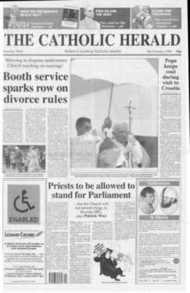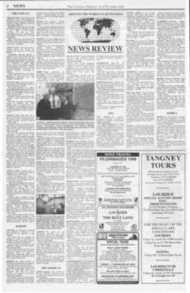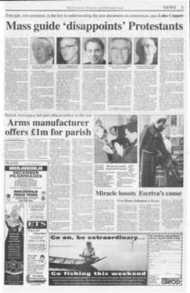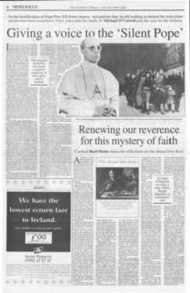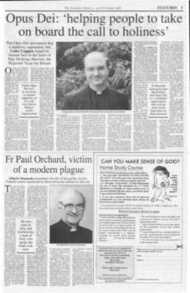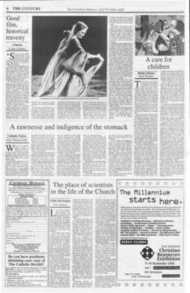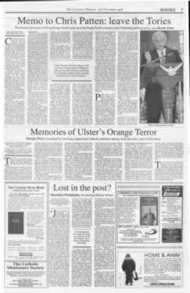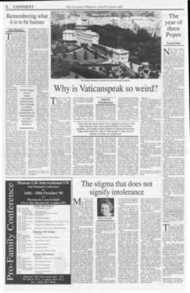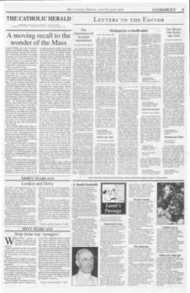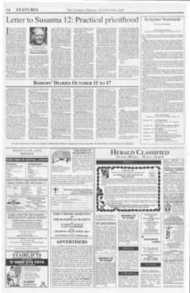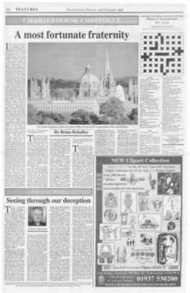Page 5, 9th October 1998
Page 5

Report an error
Noticed an error on this page?If you've noticed an error in this article please click here to report it.
Tags
Share
Related articles
Opus Dei: 'helping People To Take On Board The Call To...
A Bishop's Efforts To Improve His Clergy's Image Has...
The'ordinary Catholics Of 134)u •
T Here Are More Varieties Of Summer Dresses In The Shops
Roman Collars And White Cravats
Either Opus Dei isn't as sec retive as le gend
suppo ses, or it is just very b ad at bein a sec ret organi sation
Morrish was dressed like a dour Victorian gentleman: black frock coat, black shirt, black trousers, stiff clerical collar. (This austere uniform is apparently the norm for Opus Dei priests, inspired by the sober dress habits of the founder, Blessed Josemaria Escriva.) At the top of this column of black sat a round pallid face with rosy cheeks, thinning hair and circular spectacles, which give Fr Morrish the air of an Oxbridge chaplain.
First impressions, of course, are deceptive. Fr Morrish is far more witty and humorous than his appearance may first suggest. When asked why he was appointed regional vicar, for example. he replies: "Perhaps because there wasn't anyone else" Jokes and anecdotes punctuate his conversation. As the leader of a notoriously straightlaced and straight-faced organisation this must be a bonus.
So what exactly is a regional vicar and what do they do? A regional vicar is the highest ranking member of Opus Dei in any particular country or territory. They oversee the activities of the organisation and request permission from local bishops to extend The Work into their dioceses. They are responsible to the Opus Dei Prelate (bishop), who resides in Rome and to a committee of high-ranking members in their own territory. The structure is, Fr Morrish claims, very "collegial".
Fr Morrish was appointed regional vicar by the Prelate of Opus Dei in July. He will lead the activities of the prelature in England, Scotland. Wales and Northern Ireland for the next eight years. He admits to feeling daunted at the responsibility. "It's quite frightening to what extent we're given the responsibility of doing Opus Dei in this country," he says.
Fr Morrish first encountered Opus Dei at age eleven, when his parents (who were not members) took him to a centre in West Sussex. He began to go to a local youth club run by The Work in Balham. He fondly recalls the "excitement" of the club and the potency of the Christian forma
tion he received there. "Young people who take their faith seriously feel very alone at times," he notes. suggesting that he was unusually pious as a young man.
At the age of fifteen he was given the ultimate opportunity of an Opus Dei acolyte: a meeting with Blessed Josemaria Escriva. Fr Morrish sat enraptured in the auditorium. "I remember thinking it must have been a little like this for the apostles listening to Jesus," he says.
When Escriva took questions from the floor, Fr Morrish's heart was beating rapidly. "Towards the end of the meeting I asked him how does one know if God is calling you to serve him in Opus Deir Fr Morrish recalls that the Founder brushed the question aside like a gnat "I felt that he hadn't answered ail that I wanted him to," he says. "I changed what I was going to ask at the last moment and regretted it."
Fr Morrish had a face to face encounter when the meeting ended. "He came over and he did up my tie. It was the Seventies when people were wearing those disgusting ties. It was very wide. He said the knot was large enough to fit an orange in and he tightened it up."
Undeterred, Fr Morrish felt a call to the Opus Dei priesthood. After reading Mathematics at Oxford University, he studied theology in Rome and Pamplona, obtaining a doctorate in the history of the church. In 1983, at the age of 24, he was ordained for the Opus Dei prelature.
He worked as a chaplain at the Opus Dei centres in London and Oxford until 1992, when he began to work alongside the then regional vicar, Mgr Philip Sherington.
Just six years later he is himself regional vicar. He says he isn't planning any drastic changes. "My hope is that we will be more faithful to the spirit of our Founder. I pray that all members of Opus Dei will take a step forward in their personal life of holiness and that we will continue to grow. We are very much at the beginning and we've got a long way to go."
If Opus Dei is to grow, then Fr Morrish must persuade the bishops that Opus Dei is a creditable organisation that will do more good than harm within their dioceses. "We always make sure that we have the permission of the local bishop to carry out our apostolic activity. Starting in new places is difficult. But once people actually get to know the members of Opus Dei they are happy. The bishops are grateful for the work we do."
And Cardinal Hume, who was famously disgruntled by The Work in the Eighties/ "Relations with the Cardinal are very good at the moment. There were some problems. There were some slight misunderstandings that were perhaps magnified by the press. I'm looking forward to getting to know the Cardinal."
This new relationship was signalled on the Feast of the Guardian Angels last week, when the Cardinal celebrated Mass for the members of Opus Dei at St James's, Spanish Place. With the symbol of Opus Dei emblazoned on his vestments, surrounded by the Prelature's priests, the Cardinal gave a strong endorsement of their mission: to seek holiness in everyday life. Fr Morrish is well aware that many people, including many bishops, have reservations about Opus Dei. Naturally, he believes it doesn't deserve its negative public profile. "We are a relatively young organisation. It takes time to become known, to become appreciated. Clearly all members of Opus Dei are aiming for holiness, but they are not faultless. Obviously mistakes have been made." These mistakes, he emphasises, are on an individual level. He gives the example of members being too zealous in their attempts to recruit new members.
He denies that Opus Dei ever interferes with its members' professional lives. Nor, he says, is it secretive. "Opus Dei members don't go round with a badge advertising that they are members of Opus Dei. The reason for that is that the members of Opus Dei are ordinary lay faithful_ Otherwise it goes against the message that everyone can be holy.– On the other hand he recognises that membership of Opus Dei is not for everyone. "Opus Dei is for particular people who have a vocation. Our Founder used to say that out of 100 souls we are interested in 100. Somebody requires a divine vocation to join Opus Del."
This leaves Opus open to the criticism (forcibly made by Cardinal Martini) that it is only for "specialised Christians". Not your average pew-warmer, but a superspiritual, all-praying, all-evangelising Catholic. Fr Morrish has no time for this. -The overall purpose of Opus Dei is to help people to take on board the universal call to holiness." And over the next eight years, he will strive to take this message to as many of Britain's Catholics as possible.
blog comments powered by Disqus


